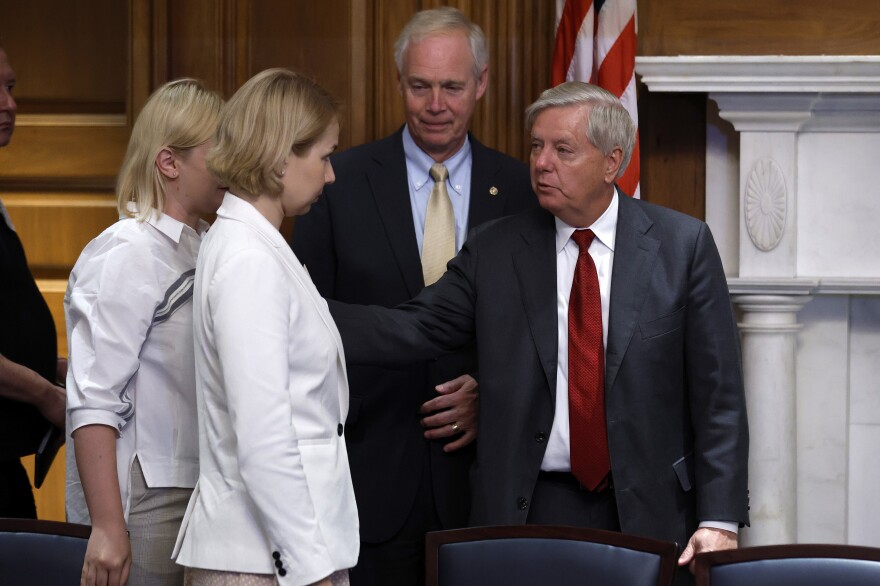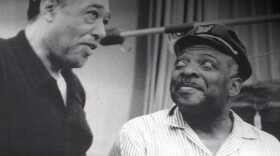KYIV, Ukraine — Sitting on a park bench by a tram stop in Kontraktova Square, Marta Makarova, a 21-year-old budding social media influencer, takes a break from talking with two friends about Instagram to talk instead about the war. Makarova explains how much of their safety depends on U.S. support.
"We have some problems in our country," she says, "and we need help, very, very, very much."
Her friend Kyrylo Bessarab, 20, a photographer, nods his head. He holds up his phone.
He says the top issues trending on his social media channels are the upcoming U.S. elections and billionaire Elon Musk's controversial comments about negotiating an end to the war.

"I know in the States there's going to be elections," Bessarab says. "Soon there might be some changes and society may be shaken."
Plugged-in Ukrainians are keeping a close eye on next month's U.S. midterm elections. The likelihood that Republicans will take control of the House has triggered concerns about long-term support for the war effort.
This week, House Republican Leader Kevin McCarthy warned that his party members will not write "a blank check" to Ukraine if they win control of the lower chamber next year.
"I think people are gonna be sitting in a recession and they're not going to write a blank check to Ukraine," he told Punchbowl News in an interview published Tuesday.
Many Ukrainians — elected officials and citizens alike — worry about how long the money will keep flowing.

"There are concerns that the support will become smaller," says Mykola Kniazhytskyi, a member of parliament who represents western Ukraine.
Dozens of House Republicans voted against a Ukraine aid bill in May. And last month, all but 10 House Republicans voted against a government funding package that included billions of dollars earmarked for Ukraine.
A line of Ukrainian politicians, activists — even soldiers — have been traveling to Washington in advance of the midterms to keep up relations and lobby for more aid.
Yevheniia Kravchuk is a member of parliament with President Volodymyr Zelenskyy's Servant of the People party. She's traveled twice to Washington since the beginning of the war to meet with administration and congressional leaders, making sure to meet with both Democratic and Republican leaders.
"And every time, from both of the parties, we receive confirmation that bipartisan support will continue," she says.
But Kniazhytskyi worries about the influence of a vocal group of Republicans, many aligned with former President Donald Trump, as well as conservative TV personalities who have been speaking out against the billions of dollars going to Ukraine.

"When we see Fox News commentators, from our perspective, promote isolationist positions — that looks like support for Russia," he says.
A Pew Research Center poll last month found that 32% of Republican and Republican-leaning independents believe the United States is providing too much support for Ukraine in the war. That's an increase from only 9% in March.
Over roughly the same time, the percentage of Americans who said they were extremely or very concerned about Ukraine's defeat fell from 55% in May to 38% in September.
The politics surrounding aid to Ukraine is not an easy subject to talk about in Kyiv, where government officials say avoiding partisan politics in the U.S. is a key pillar of Ukrainian foreign policy. That was the lesson learned during the Trump years, says Petro Burkovskiy, a senior fellow at the Democratic Initiatives Foundation who spent years in the Ukrainian government.

Speaking at a mall that reopened after being bombed, Burkovskiy says leaders never want to appear to take sides.
"It means that you're hedging your bets, working with both parties," he says.
Burkovskiy laments how Ukraine got sucked into Trump's first impeachment, after Zelenskyy came close to submitting to Trump's demand to announce an investigation into the family of then-candidate Joe Biden.
Another factor contributing to fears about the U.S. midterms is that many Ukrainians don't understand U.S. politics, says Volodmyr Dubovyk, the director of international studies at Odesa Mechnikov University.
He's had to tell several Ukrainian reporters in recent weeks that, no, their country will not lose weapons if Republicans take the House.
"When there is someone, let's say a member of House, and he or she speaks about 'why are we spending money and Ukraine is corrupt, is not winning,' and people in Ukraine hear this — it means, like, 'Oh my God, that's a new American position that's going to prevail,'" he says.
At a downtown coffee shop, Vadym Zahozytsky, 24, who works at a local insurance company, says he's not worried.
The balance of power in Washington means that a few Republicans can't change the direction of U.S. support for the war, he believes. And he emphasizes that Ukraine has much bigger problems than U.S. politics.
"I have concerns about the politics of only one country that affects Ukraine and our security," he says. "Russia."
Copyright 2023 NPR. To see more, visit https://www.npr.org.





